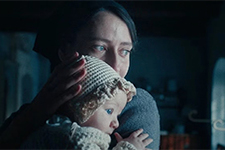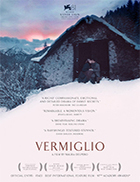Vermiglio
|  The title of Maura Delpero’s Vermiglio derives from the name of a small town that lies in the Sole Valley in northern Italy, deep in the Brenta Dolomites mountain range. It is a striking location, especially in the winter, which dominates the first half of the film with its frigid-blue light that makes the images very nearly monochromatic. The story takes place in 1944, in the waning years of World War II, which is both omnipresent and utterly remote to the town. Vermiglio is situated so far from the front lines and Mussolini’s fascist political machinations that it might as well be in another universe, which is why, when a Sicilian soldier named Pietro (Giuseppe De Domenico) appears in the town after having deserted the military, it is no small event. The town, which seems to have changed little since the 19th century, is dominated by Cesare Graziadei (Tommaso Ragno), who heads a large family and is also the local schoolteacher, instructing not just children, but also adults. Part of his patriarchal power—which extends beyond his immediate family to the town at large—lies in the tests he gives at the school, which functionally determine what the town’s children will do when they grow up. We get the sense that Cesare is a decent man and that he wants to do the right thing, which is why he is one of the only men in town to defend Pietro’s desertion when others brand him a coward. Yet, there is also the sense that too much power invested in any one person, no matter how well-meaning, is always destined to cause problems. Cesare and his wife, Adele (Roberta Rovelli), have nine children. The oldest two are daughters: Lucia (Martina Scrinzi), a quiet and thoughtful young woman who falls in love with Pietro, and Ada (Rachele Potrich), a teenager who is struggling with her emerging development and sexuality. There are a number of entangled plot developments that stretch out through the film’s second half, much of which has to do with Pietro’s past life back in Sicily and what happens when Lucia gives birth to their daughter. Any of it could have been fodder for easy melodrama, but Delpero keeps a tight hold on the proceedings, doling the story out with such a measured pace that it never risks becoming overheating. This both the film’s strength and its weakness, as the deliberate nature of the approach and the starkness with which Delpero treats the characters and their plights holds us at a remove, making it hard to become fully invested in everything that is happening. The film is gorgeous, no doubt, as cinematographer Mikhail Krichman (who has regularly collaborated with Russian director Andrey Zvyagintsev) uses his sharp, painterly eye to capture the northern Italian landscapes, which often feel overwhelming in their intensity and remoteness. Delpero uses those landscapes powerfully, but she has also paid close attention to cultural and historical detail, down to having the characters speak in the unique dialect of the region (something that will be lost on non-Italian speakers like myself). Vermiglio, which won the Grand Jury Prize at the 2024 Venice Film Festival, has much to say and will reward those who have the patience to absorb all it has to offer, although others will find it too grave and deliberate to achieve the emotional depths Delpero is clearly mining.
Copyright © 2025 James Kendrick Thoughts? E-mail James Kendrick All images copyright © Janus Films | |||||||||||||||||||||||||||||
Overall Rating: 

 (2.5)
(2.5)


